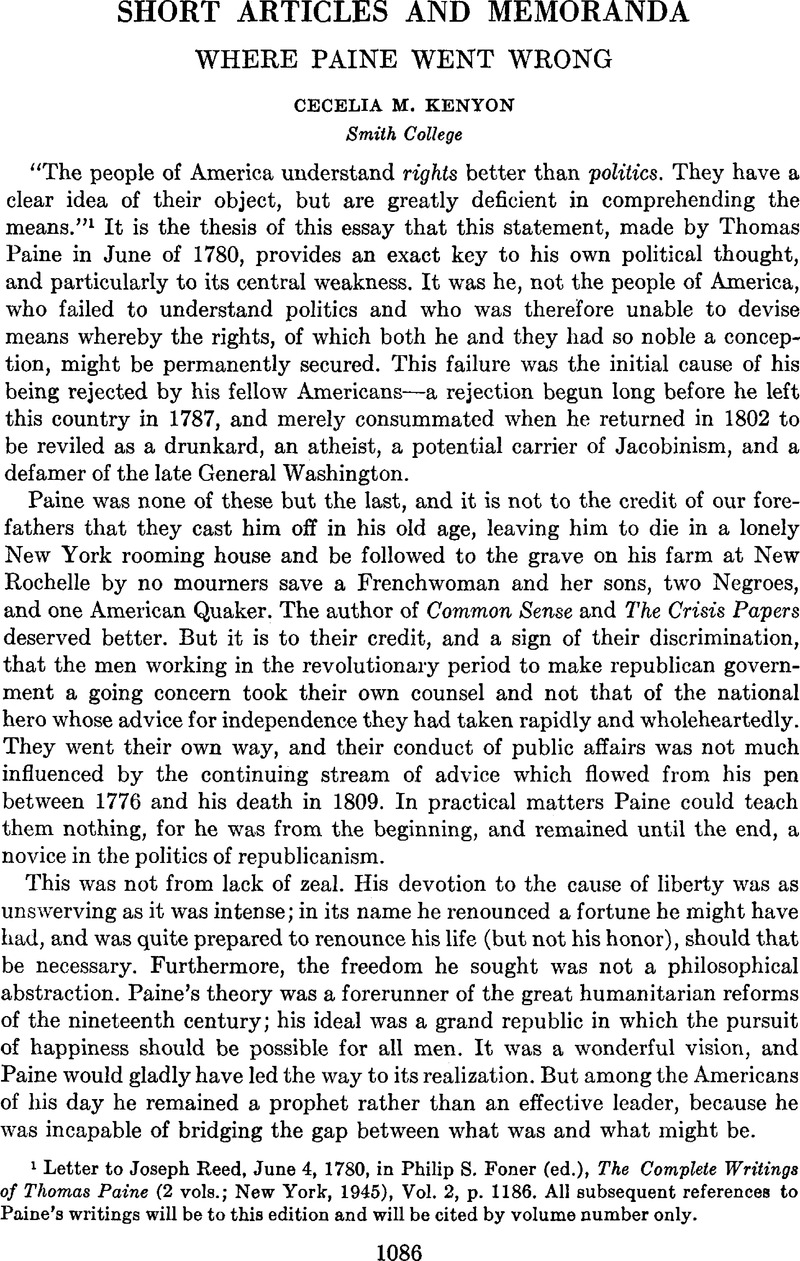Published online by Cambridge University Press: 02 September 2013

1 Letter to Joseph Reed, June 4, 1780, in Foner, Philip S. (ed.), The Complete Writings of Thomas Paine (2 vols.; New York, 1945), Vol. 2, p. 1186Google Scholar. All subsequent references to Paine's writings will be to this edition and will be cited by volume number only.
2 Dissertation on First Principles of Government (1795), Vol. 2, p. 583Google Scholar.
3 The Rights of Man (1791), Vol. 1, pp. 273–274Google Scholar.
4 Dissertation on First Principles, Vol. 2, p. 583Google Scholar.
5 The “Plan of a Declaration,” a document prepared by a committee appointed by the National Convention in 1792 to draw up a constitution for France, which may have been written in part by Paine, contains a fairly complete list of what might be called civil, political, and social or economic rights. See Vol. 2, pp. 558–560.
6 Letter to Thomas Jefferson, (?), 1789, Vol. 2, p. 1298; cf. The Rights of Man, Vol. 1, p. 275Google Scholar.
7 Idem.
8 Idem., and Vol. 1, pp. 275–276.
9 The Rights of Man, Vol. 1, p. 274Google Scholar; cf. Common Sense, Vol. 1, pp. 9, 13Google Scholar; and Dissertation on First Principles, Vol. 2, p. 583Google Scholar.
10 Dissertation on First Principles, Vol. 2, p. 576Google Scholar.
11 Ibid., p. 577.
12 Ibid., pp. 577–578.
13 Common Sense, Vol. 1, p. 9Google Scholar.
14 The Rights of Man, Vol. 1, p. 343Google Scholar; see also The American Crisis, Vol. 1, p. 136Google Scholar.
15 Vol. 1, p. 4.
16 Vol. 1, p. 357.
17 Common Sense, Vol. 1, pp. 4–6Google Scholar.
18 Idem.; see also Rights of Man, Vol. 1, p. 275Google Scholar.
19 Dissertation on First Principles, Vol. 2, p. 583Google Scholar.
20 Constitutional Reform; To the Citizens of Pennsylvania on the Proposal for Calling a Convention (1805), Vol. 2, p. 1001Google Scholar.
21 Dissertation on First Principles, Vol. 2, p. 579Google Scholar.
22 The Forester's Letters, a series of letters written in 1776 in reply to Tory attacks on Common Sense, Vol. 2, p. 80.
23 Dissertation on First Principles, Vol. 2, p. 584Google Scholar.
24 Vol. 1, p. 8.
25 “A Serious Address to the People of Pennsylvania on the Present Situation of their Affairs” (1778), Vol. 2, p. 295Google Scholar.
26 Dissertation on First Principles, Vol. 2, p. 587Google Scholar.
27 “A Dialogue Between General Wolfe and General Gage in a Wood Near Boston” (Jan. 4, 1775), Vol. 2, p. 48Google Scholar.
28 “Address to the People of Pennsylvania,” Vol. 2, p. 288Google Scholar.
29 It should be noted that the colonial legislature of Pennsylvania was unicameral, and that this precedent would naturally have made unicameralism congenial because familiar to the people of that state. Their adoption of the system cannot be attributed solely to Paine's influence.
30 Vol 2, p. 1256.
31 Dissertations on Government; The Affairs of the Bank; and Paper Money (Feb., 1786), Vol. 2, p. 410Google Scholar.
32 Ibid., p. 414.
33 Ibid., pp. 378–382.
34 See Wright, B. F. Jr., The Contract Clause of the Constitution (Cambridge, 1938), pp. 16–18Google Scholar.
35 Constitutions, Charters, and Governments (1805), Vol. 2, pp. 991–992Google Scholar.
36 Dissertations on Government, Vol. 2, p. 409Google Scholar.
37 “Answer to Four Questions on the Legislative and Executive Powers” (1792), Vol. 2, pp. 526–527Google Scholar; Dissertation on First Principles, Vol. 2, p. 585Google Scholar.
38 “Address to the People of Pennsylvania,” Vol. 2, p. 294Google Scholar.
39 The Federalist, No. 10 (Modern Library ed; New York, 1941), p. 56Google Scholar.
40 Public Good (1780), Vol. 2, p. 306Google Scholar.
41 Vol. 1, pp. 369–370.
42 See, e.g., Vol. 2, pp. 279, 362.
43 Paine's later application for compensation for his revolutionary services from the Continental Congress and/or the state legislatures suggests that even the sacrifice of those years was accompanied with the comfortable expectation of the reward common in aristocracies—a grant or a pension.
44 Dissertations on Government, Vol. 2, p. 372Google Scholar.
45 Letter Addressed to the Addressers on the Late Proclamation (1792), Vol. 2, p. 511Google Scholar.
46 Constitutional Reform; To the Citizens of Pennsylvania on the Proposal for Calling a Convention, Vol. 2, p. 1002Google Scholar.
Comments
No Comments have been published for this article.